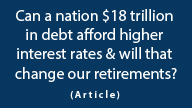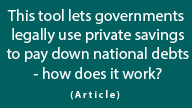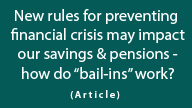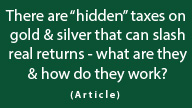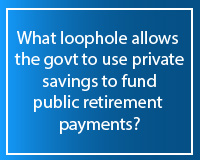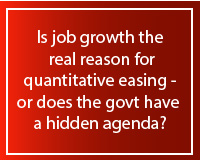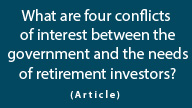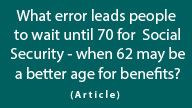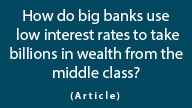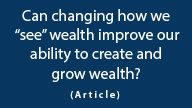Will Your Retirement Accounts Survive The Coming Tax Code "Revolution"?
By Daniel R. Amerman, CFA
Below is the 2nd half of this article, and it begins where the 1st half which is carried on other websites left off. If you would prefer to read (or link) the article in single page form, the private one page version for subscribers can be found here:
Preparing For The Fall
Let's return to the siege metaphor with which we began. We are in the capital City, and it appears that the "government" (in its current fiscal form anyway) – and the tax code as we know it – are likely to fall. Every time you read an article about the impossible financial situation of the US government, or its irresponsible spending, or monetary creation and manipulations by the Federal Reserve or other central banks on a massive scale – what you are seeing are the campfires of the surrounding armies.
We do not yet know the specifics, but there are an extraordinary number of campfires burning out there – to the extent that we know the capital City will fall, it is just a question of the form and the timing.
The fundamental nature of retirement investment for most people in the United States as well as around the world is to segregate their assets into highly visible "boxes", the defense of which is likely to at least partially fail – and maybe entirely fail – upon the arrival of the new regime.
I do strongly believe that there are solutions to this dilemma – but they are not found in the usual places. The starting point is to accept reality, and to accept that the tax code is likely to radically change at some point over the next one to two decades. The first major changes may arrive much sooner than that, and there may be several waves of major changes over time.
The farther out in time we go in our search for financial security, then the more we must take into account the possibility that the "City" (our current tax code) will have fallen by that time, and the more substantial the changes may be when it comes to (currently) tax-advantaged retirement accounts.
Granted, to begin with a starting assumption that the rules will change, and to then seek to maintain financial security nonetheless can be a much more uncomfortable process than merely staying in the middle of the herd. Because so long as we follow the very widely-accepted advice, then there is no challenge, and there's a certain sense of security in doing what everyone else is doing, even as we're given soothing assurances from every direction that the experts know what they are talking about, that this is a solved science, and that there is nothing to worry about. In other words, we have a comfortable cocoon of seeming certainty.
We just need to ignore those countless campfires surrounding our City.
Because if we don't – the moment we acknowledge that the retirement promises are eventually not just unpayable, but are not even close to being payable – then the cocoon vanishes, along with all the soothing assurances and promises.
It is when the campfires are acknowledged that the essential personal choices must be made. With the first choice being whether to do anything at all. For it is simply human nature that even if the campfires are seen, many or most people will nonetheless disregard them, if that is what everyone around them is doing.
Yet, no matter how universal the current narrative is when it comes to ignoring the surrounding army, it does not change the individual reality for each of us. For if the City does eventually fall at some point, then it is likely that every aspect of our current retirement account tax code will come "into play", along with potentially every aspect of our expected financial security.
 What you have just read is an "eye-opener" about one aspect of the often hidden redistributions of wealth that go on all around us, every day.
What you have just read is an "eye-opener" about one aspect of the often hidden redistributions of wealth that go on all around us, every day.
 A personal retirement "eye-opener" linked here shows how the government's actions to reduce interest payments on the national debt can reduce retirement investment wealth accumulation by 95% over thirty years, and how the government is reducing standards of living for those already retired by almost 50%.
A personal retirement "eye-opener" linked here shows how the government's actions to reduce interest payments on the national debt can reduce retirement investment wealth accumulation by 95% over thirty years, and how the government is reducing standards of living for those already retired by almost 50%.
 An "eye-opener" tutorial of a quite different kind is linked here, and it shows how governments use inflation and the tax code to take wealth from unknowing precious metals investors, so that the higher inflation goes, and the higher precious metals prices climb - the more of the investor's net worth ends up with the government.
An "eye-opener" tutorial of a quite different kind is linked here, and it shows how governments use inflation and the tax code to take wealth from unknowing precious metals investors, so that the higher inflation goes, and the higher precious metals prices climb - the more of the investor's net worth ends up with the government.
 Another "eye-opener" tutorial is linked here, and it shows how governments can use the 1-2 combination of their control over both interest rates and inflation to take wealth from unsuspecting private savers in order to pay down massive public debts.
Another "eye-opener" tutorial is linked here, and it shows how governments can use the 1-2 combination of their control over both interest rates and inflation to take wealth from unsuspecting private savers in order to pay down massive public debts.







If you find these "eye-openers" to be interesting and useful, there is an entire free book of them available here, including many that are only in the book. The advantage to the book is that the tutorials can build on each other, so that in combination we can find ways of defending ourselves, and even learn how to position ourselves to benefit from the hidden redistributions of wealth.


